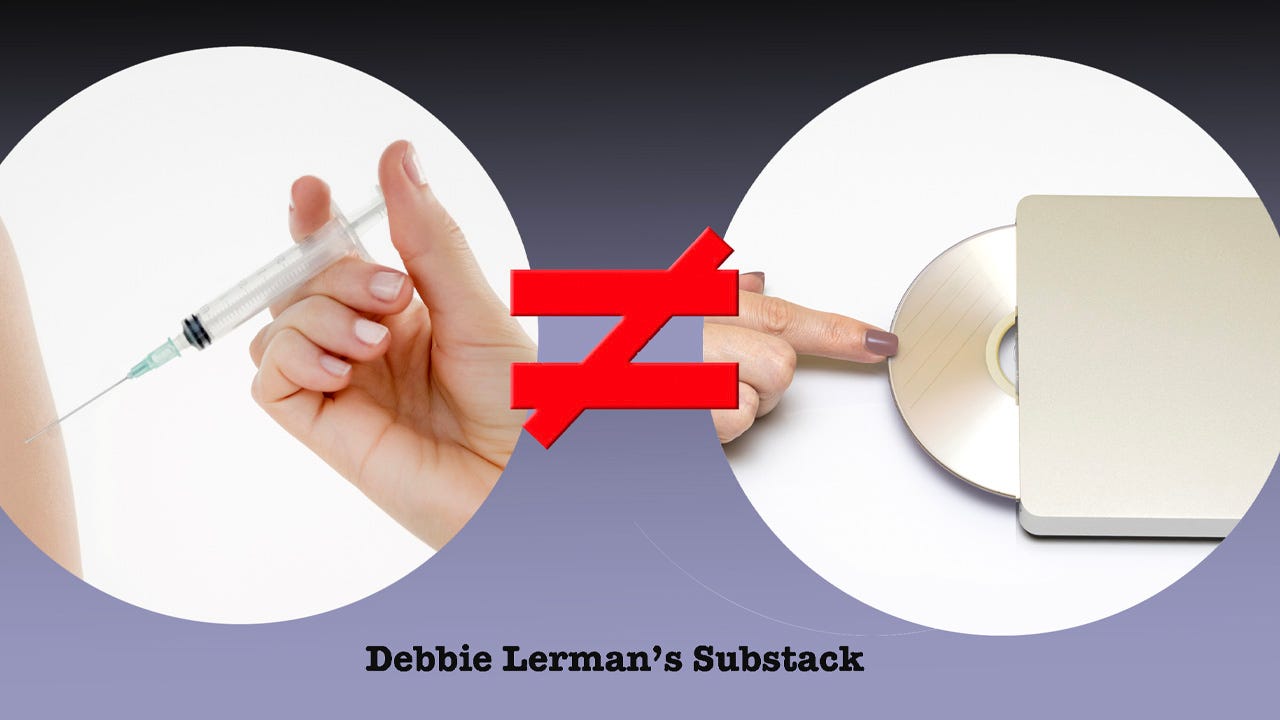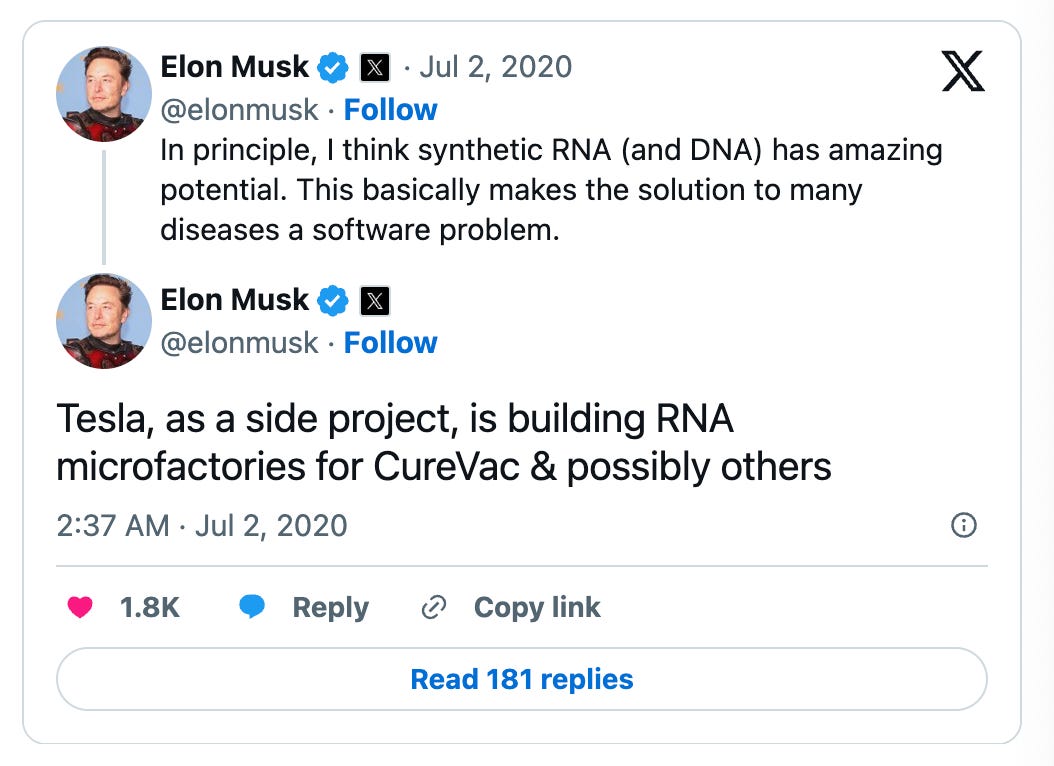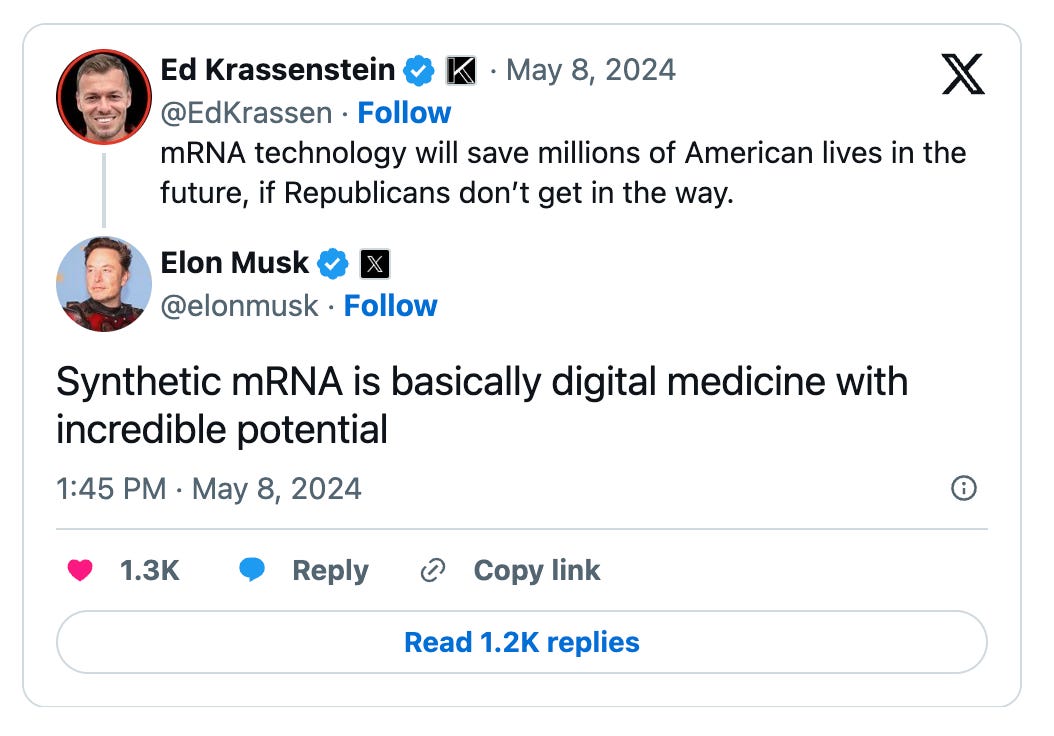Hey, Elon: If You Want to Invest in Biotech, Learn Some Bio!
Hey, Elon: If You Want to Invest in Biotech, Learn Some Bio!
The entire biotechnology endeavor needs to take a huge step back - show some humility, admit how little we know, and stop pushing out dangerous and deadly products.
Debbie Lerman

In a recent article entitled “Elon Musk’s Love Affair with mRNA,” Substacker and journalist Robert Kogon noted that Elon Musk has invested in “mRNA technology” since before Covid, when Musk’s Tesla partnered with the German mRNA company CureVac to produce so-called “RNA printers”: an automated system for manufacturing mRNA and mRNA-based drugs.
Musk enthusiastically tweeted about his investment, and his general belief in the medical potential of lab-made genetic products back in 2020 and again four years later:
July 2, 2020
“This [synthetic RNA and DNA] basically makes the solution to many diseases a software problem”
May 8, 20204
“Synthetic mRNA is basically digital medicine with incredible potential”
In between those two tweets we, of course, experienced Covid and the Covid mRNA vaccines.
[Note: I am using the word “vaccines” because that is what these products are commonly called. I am aware that they are biological products rebranded for the purpose of the global vaccination campaign.]
Covid mRNA vaccines: enormous financial success for abject medical failure
There are two issues here: the money, and the science. These are not specific to Covid mRNA vaccines nor to Elon Musk as an investor, but the vaccines and Musk are a good case study for where we are with biotech investment in general.
Big money
The Covid mRNA vaccines were one of the most lucrative products in the history of pharmaceuticals. This is not because they worked. It is because they were rushed through design and manufacturing processes and forced into billions of arms worldwide with no real regulatory oversight.
As Max Jones explains in his excellent Unlimited Hangout article “Building a Permanent Pandemic Market,” this type of regulatory shortcut is the new normal for the too-big-to-fail pharmaceutical industry in its attempt to avoid falling off the “patent cliff.” As its most profitable products go off patent, and with stultifying consolidation, the industry must push out the only innovations in its pipeline – complex and unpredictable experimental biotech products. And the only way to push them onto the market quickly is by sidestepping the necessarily long and painstaking safety studies applied to all other medical products.
That is what happened with the mRNA Covid vaccines, and it is also happening with the entire industry moving forward. The big money is not in the usefulness of the products, but in the ability to make and market them without regulatory hurdles.
Thus, if money is all Elon Musk – and other tech entrepreneurs who are jumping on the biotech bandwagon – care about, we can stop here. The path to deregulation of biotech products is well underway and promises a hefty return on investment.
If, however, those investors truly believe in the underlying transformative power of biotechnology, they need to take a good hard look at the science and the fatal flaws in the biotech miracle narrative.
Medical disaster
As an example, here’s a summary of the giant medical failure of the Covid mRNA vaccines:
They completely failed at what they were designed to do: lower the risk of acquiring or transmitting Covid-19. This, in itself, makes them a failed product.
They have no other provable benefits. Claims that they lower the risk of serious illness or death are not supported by any rigorous scientific data.
They have the worst safety track record of any vaccines in recorded history. If there had not been a global panic leading to Emergency Use Authorization and the legal protection of the PREP Act, the number of adverse event reports following Covid mRNA injections would have prompted a recall and prevented them from ever being used again.
This failure is not a minor software glitch on a coding journey to biotech success. Rather, it demonstrates the enormous difficulty of getting a biotech product made in a lab to work in a biological system (e.g., the human body) the way you want, without causing too many side effects.
Bottom line: When making treatments for humans, side effects are not the side show. They are the main event.
Hubris and Ignorance
Trying to understand Musk’s unmitigated enthusiasm for “synthetic mRNA” and giving him the benefit of the doubt that he does not want to intentionally hurt and kill people, and that he actually wants the biotech mRNA miracle to work, I came up with two related explanations:
1) Musk does not even know that the Covid vaccines were a medical failure, because he believes the media hype/propaganda and has never looked into the science. That is plausible and regrettable, considering how much influence he has and how much people admire and emulate his choices.
2) Musk exemplifies two interrelated conditions of people who have made enormous fortunes in the tech world: monumental hubris about what computer technology can accomplish, and deep ignorance about anything not computer-related.
In fact, as evidenced in Musk’s tweets and many books and articles written by technocracy advocates, those who have spent most of their life in the digital tech world believe the way computer technology operates can explain the way everything else in the world, including biological systems – and even human consciousness! – functions.
Furthermore, DNA and RNA, often called the blueprint of life, seem like computer code that can be used to manipulate and enhance how biological systems operate. Creating copies of such molecules in a lab might lead to the very heady belief that, like a god, you can control the code of life itself.
That is the very definition of hubris.
Just Because We Call It “Biotech” Does Not Mean Biology = Technology

Biotechnology, or biotech, is commonly defined as “the use of biology to develop new products, methods, and organisms intended to improve human health and society.” [ref]
As the website Tech Target explains, “Early applications of biotech led to the development of products such as bread and vaccines. However, the discipline has evolved significantly over the last century in ways that manipulate the genetic structures and biomolecular processes of living organisms.”
According to the University of Pennsylvania’s Master of Biotechnology website, “In its broadest definition, biotechnology is the use of advances in molecular biology for applications in human and animal health, agriculture, environment, and specialty biochemical manufacturing.”
The site goes on to explain that “With the completion of the human genome project, the subsequent understanding of what these genes code for and how the products of these genes relate and interact, will completely transform the practice of medicine.”
It is important to understand these definitions, so we can understand where computer technology, software, and other computer-related processes fit in.
It’s all about biology
As indicated by all of the above definitions, biotech is a sub-discipline of biology. It entails figuring out how biological systems can be manipulated to bring about various desirable results, like using yeast to make bread or dead viruses to stimulate a human immune response. In molecular terms, it means learning how genes code for proteins, or how certain chemicals work in the body, and trying to use that knowledge to “improve human health and society.”
The important definitional point is that both the “bio” and the “tech” refer to biological systems, processes and products, and the novel ways in which we might use them to improve our lives.
Computer technology is just a tool
There is no part of biotechnology that is digital or computer-related. Computer technology is an external, non-biological tool that can potentially help us make more complex biotech products.
Indeed, computers have made it possible to do extraordinary things like map the human genome and create molecules in the lab modeled on molecules that exist in biological systems. However, computers provide little understanding as to how those molecules, made in a lab, will behave once they are introduced into a living system. In fact, although the human genome was mapped in 2003, we still have very little insight into the unimaginably complex way the genetic code actually functions.
Put simply, the enormous advances in digital technology we have seen over the past 20 years do not correspond to a similarly impressive revolution in our ability to manipulate biological systems.
Humility and curiosity
If anyone is interested in pursuing biotechnological advances in an ethical, scientifically and medically sound manner, then we need a hefty dose of humility and curiosity.
Humility in the face of the enormous complexity of biological systems, and curiosity to learn more, without the corrupting – and potentially lethal – perverse incentives of corporate profit.
At the very least, we should stop thinking that biotechnology entails some kind of combination of biology and computer technology, or that it implies similarities between digital and biological systems. It does not.
As for Elon Musk and the rest of the tech enthusiasts piling into the biotech space: Please stop falling for the hype, and avoid the temptation of profits realized through deregulation and market manipulation. Learn how the synthetic molecules produced by your high-tech printers actually interact with and affect the biological systems – human bodies – into which they are injected.
If you and/or people you love have been injected with Covid mRNA vaccines, this can be a frightening investigative path to pursue. But maybe with the life and health of you and your loved ones on the line, you will join the call for withdrawal of these products from the market until their safety and efficacy can be demonstrated through properly conducted clinical trials.
Source: Debbie Lerman's Substack


Comments
Post a Comment